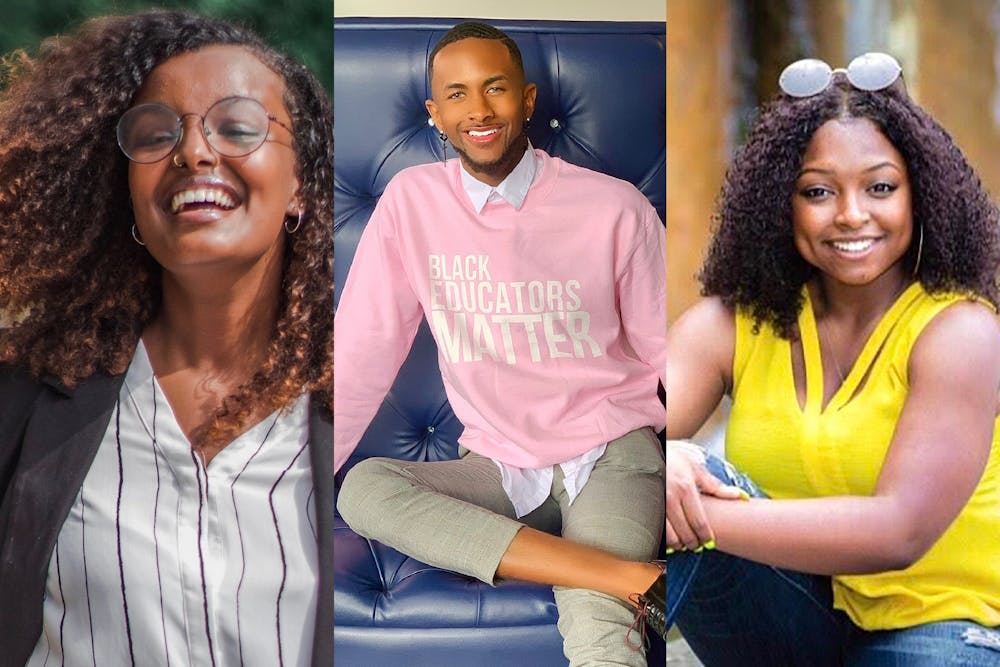Salina Tesfagiorgis would look around her classroom at the Hamilton Lugar School of Global and International Studies and feel lonesome. Just a handful of students were Black like her, and course material as an international studies major often excluded texts written by Black internationalists.
Ky Freeman watched as his inbox flooded with emails from institutional leaders about Juneteenth and Black Lives Matter who meanwhile hesitated to rename buildings, streets and rivers named after a eugenicist.
Tiana Williams was asked to act “a bit more ghetto” as a Black character in the show “Legally Blonde," produced by the Booth Tarkington Civic Theatre in Carmel in 2016, and directors have cast her as a token or accent character in plenty of shows written for, and directed by, white people.
All of these IU students have experienced racism throughout their lives and are now finding ways to fundamentally change the industries and fields of study they are entering into.
Tesfagiorgis, a rising senior beginning her master’s degree through the integrated B.A./M.A. program at the Hamilton Lugar School of Global and International Studies, is one of the organizers of Enough is Enough, a local Black activist group.
“I feel like the whole movement that we’ve been a part of started as emotion, very valid emotion,” she said. “It came from us being Black and being hurt.”
She is in direct contact with the dean of the Hamilton Lugar School through the Global Student Seven advisory board, where she is working toward creating a course about Black perspectives on international theory. Course material would be based on text from Black internationalists and authors and would be taught by a Black professor.
Despite being a very diverse and inclusive school, the classes teach mostly Western ideologies, Tesfagiorgis said. There are also few Black faculty and students within the school. Whenever she has an opportunity in class, Tesfagiorgis focuses her projects on Black groups in different countries that were not talked about in class, such as Afro-Latinx groups in Latin America or the Flint, Michigan, water crisis.
“Blackness can be seen in a global perspective, and it’s not,” Tesfagiorgis said. “But it should, and it can.”
Freeman, a rising junior in secondary English education and president of the Black Student Union, said activism has always been a part of his life. He is critical of institutional announcements and changes, such as timely emails recognizing Juneteenth or the creation of new diversity and equity roles in management. He says these are merely micro-reforms, and in order to create substantive and meaningful change, students must mobilize.
“I don’t accept micro-reforms on a silver platter and call it activism nor substantive change,” Freeman said. “You’re going to have to show me something that shifts the power and the authority that Black people have not been awarded all this time.”
But the lack of transparency about institutional practices that maintain racism prevents students from effectively mobilizing, Freeman said. For change, different campus departments and organizations must work collaboratively to shift the authority from the highest-paid leaders to the people.
Tiana Williams is a rising junior majoring in musical theatre, a programming chair for the IU NAACP and the diversity representative for the Student Advisory Board of the IU department of Theatre, Drama and Contemporary Dance. She said she plans to use these platforms to push for renaming IU buildings, foster a better relationship with IUPD, educate students about the history and achievements of people of color and creating a casual environment of advocacy.
Performance has always been a part of her life, and she said she feels most authentic onstage. The theater industry is already competitive, and being Black compounds that.
“It being competitive for me personally has everything to do with being Black and a Black woman specifically,” Williams said.
Directors can take two actionable steps to genuinely include Black actors in their shows, Williams said. For one, unless the show specifically demonstrates racial dynamics, there should be no reason why a Black actor cannot fill a traditionally white role, she said. The industry also needs to write and put on more shows that normalize the global existence of Black, Latinx, Indigenous, Asian and other identities of people, she said.
Over time, after seeing the lack of inclusion of Black actors on stage and in production teams, Williams has learned to confront directors about their racist comments or ignorance over email and face-to-face.
“I’m very used to it now,” Williams said about being vocal about racism. “Of course you have to pick your battles, but I’m no longer hesitant to speak out on that type of stuff. It’s just too damaging. No matter how casual it is.”
While young Black leaders exist on IU’s campus, it is everyone’s responsibility to fight for social justice, Freeman said. He encourages IU students to learn the history of the university, understand that they are the driving force of the institution and remember that growth only happens in the uncomfortable moments.
“Be genuine about it,” Freeman said about fighting for social justice. “Let actions match your words, and above all things, keep that same energy two months from now, one year from now, two years from now.”
CLARIFICATION: A previous version of this story said Tiana Williams uses her platforms to push for change on campus. She is planning on using her platforms to do this.




